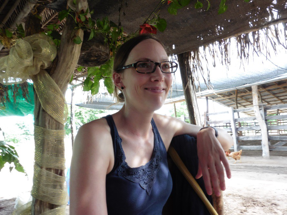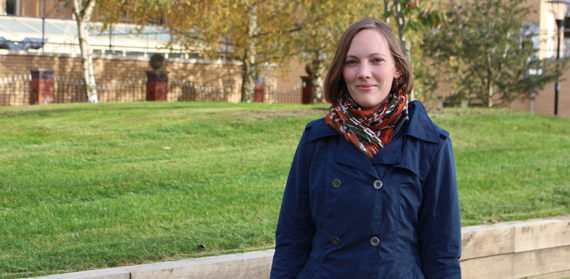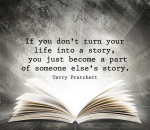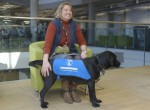I am writing this piece in the heat of Colombia’s Caribbean coast, finishing nine months of fieldwork. This sounds a lot more attractive than it actually is, since most of the time there is no electricity and therefore I have spent many hours sweating above my computer. Nevertheless, it has been a great experience I wouldn’t want to have missed.
Before telling some more about my research, I will tell a little bit more about myself. After working for over five years as a researcher and team coordinator for a human rights organisation in Guatemala on projects related to gender-sensitive transitional justice and the prevention of violence against women, I decided that what I like to do best is research, and that doing a PhD would probably be the best way of strengthening my research skills and guaranteeing a research job in the future. I have never regretted this decision.
 In September 2014 I moved back to Europe to start my PhD at the Centre for Trust, Peace and Social Relations at Coventry University. My main research interest is a field called transitional justice, which refers to the set of mechanisms most countries put in place after a period of conflict or authoritarian rule. These often include truth commissions, prosecutions, reparation programmes and measures to prevent the recurrence of conflict. Yet as a result of my previous experience in Guatemala, I know that often these mechanisms look quite different on paper than they are in practice, while often they don’t manage –or even intend– to change the situation of structural inequality that the survivors of conflict suffer, and that led to conflict in the first place. My main interest is therefore analysing conflict survivors’ experiences with these mechanisms, understand whether they really respond to survivors’ needs, and whether they are capable of structurally transforming their situation. Moreover, I am interested in analysing how conflict affects gender relations, whether and how transitional justice mechanisms are capable of addressing and transforming gender relations, and what ‘gendered’ reconciliation and peace look like for the people affected by conflict.
In September 2014 I moved back to Europe to start my PhD at the Centre for Trust, Peace and Social Relations at Coventry University. My main research interest is a field called transitional justice, which refers to the set of mechanisms most countries put in place after a period of conflict or authoritarian rule. These often include truth commissions, prosecutions, reparation programmes and measures to prevent the recurrence of conflict. Yet as a result of my previous experience in Guatemala, I know that often these mechanisms look quite different on paper than they are in practice, while often they don’t manage –or even intend– to change the situation of structural inequality that the survivors of conflict suffer, and that led to conflict in the first place. My main interest is therefore analysing conflict survivors’ experiences with these mechanisms, understand whether they really respond to survivors’ needs, and whether they are capable of structurally transforming their situation. Moreover, I am interested in analysing how conflict affects gender relations, whether and how transitional justice mechanisms are capable of addressing and transforming gender relations, and what ‘gendered’ reconciliation and peace look like for the people affected by conflict.
In order to analyse whether reparations can contribute to the transformation of structural gender inequality, I decided to undertake my fieldwork in Colombia, where an ambitious reparations and land restitution programme is being implemented since 2011. My fieldwork has taken me to two small villages in the Magdalena department of Colombia, where I have lived and worked for around nine months. The people in these villages have been displaced by paramilitary groups during ten years. Eight years ago they returned to their land. Now they are waiting for land restitution and reparations, a process that involves lots of meetings with numerous state institutions, lots of promises that most of the time aren’t kept, leading to frustration and weariness. I have been able to experience part of this process by attending many meetings, interviewing people and having lots of informal chats, learning about people’s experiences, needs and expectations. I have also undertaken visual research with two groups of women, in which they took pictures of their daily lives and the obstacles they identify for having a better life, which helped me understand their needs better. At the same time it helped them to analyse their needs and present the demands they as women want to make to the state in a booklet with their own pictures and texts.
Living here has been quite an experience in different ways. In the first time, although I had lived in Latin America for years, I had never lived in such an isolated place, lacking basic development services like running water or electricity. In these villages I lived in people’s houses, which implied a complete immersion in their culture and way of life, including defying the blazing sun while walking across the villages, sometimes crossing them on horseback since the dirt roads become puddles of mud after heavy rain, inaccessible for any other means of transportation than horse or donkey. It meant eating more yucca than I could ever imagine eating in a life time and resorting to vitamin pills due to a lack of fruit and vegetables in the people’s diet. But it also meant somehow becoming part of two farmers’ communities, little by little gaining the trust of the people and making friends from whom I have learned so many things I’d never imagined I’d learn, for example about cattle farming. Moreover, I can now proudly say a cow in Colombia is called Sanne!
But most of all it has been an incredible opportunity to really learn what transitional justice processes are for the people who are ‘benefitting’ from them. I have learned so many things both on an academic and personal level, which have made these nine months of fieldwork an unforgettable experience. My next challenge is to make sense of all the data, write my thesis, and try to get my research results across to an audience of not just academics but also practitioners, since I hope my research will be able to contribute to transitional justice being more responsive to survivors’ needs and to the transformation of gender inequality.
When I started my PhD, my idea was to go back to working in civil society organisations after finishing. By now I am considering doing a postdoc, since I’d like to stay in academia. Doing a PhD gives you the freedom to choose to do research on a topic you are really passionate about, and gives you the time to go into much more depth than I have ever experienced before. I would advise future students to think well about their research topic and choose something they are really interested in, since you will spend three years working on it and thinking about it continuously. Flexibility is also an important asset, since reality is often not like you’ve planned, and it is important to adapt to changing circumstances. But if you find this topic you are passionate about, doing a PhD is very rewarding, and a unique chance to learn how to become a good researcher, while gaining incredible life experience.






